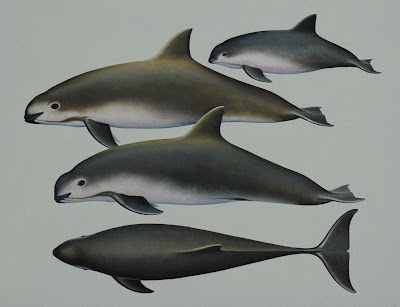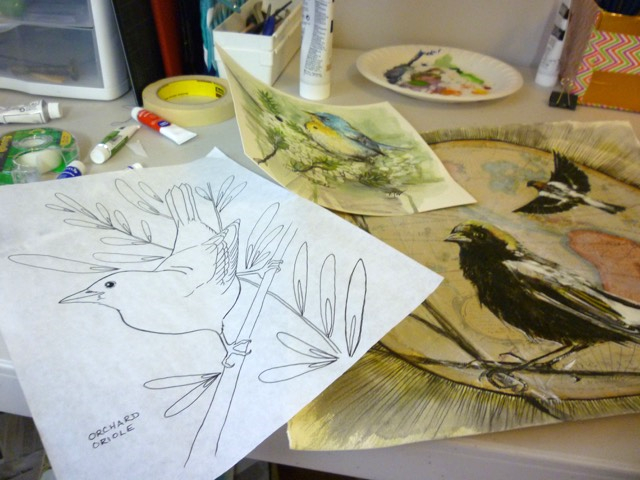Endangered Strangers: The Vaquita
Yo soy guapo! You soy chico! Yo soy raro!
Yo soy la Vaquita!
 Vaquita photo by Barb Taylor
Vaquita photo by Barb Taylor
Ssssqueak, squeeek! Squizzle! Ssssssqueeeee!
Yo soy la Vaquita!
 Vaquita photo by Barb Taylor
Vaquita photo by Barb TaylorSsssqueak, squeeek! Squizzle! Ssssssqueeeee!
Allow me to translate. That's our poquita Vaquita friend's way of saying, "Help us, amigas! Por Favor!" And seriously, one look at that little face -- how can you resist? You're not resisting, you say? Oh good...Fellow Vaquita lovers, please read on:
The Vaquita (Phocoena sinus), whose name means "little cow" in Spanish, is one of the worlds smallest cetaceans (a group which included dolphins, whales and porpoises), and is certainly one of the most adorable and charming too. Sadly, since the Baiji of China has recently become extinct, the Vaquita is now Earth's most critically endangered cetacean, with estimates putting the population between 100-300.
Vaquitas live only in the Gulf of California (Sea of Cortez) -- which is the body of water between the skinny peninsula of Baja California and Mexico. In fact, Vaquitas only live in the extreme north of this body of water, also making them the cetacean with the most limited range.
Due to their small range, the existence of this rare porpoise was only confirmed in 1985. Though Vaquitas have never been hunted directly, they are often trapped and killed in gillnets set to catch fish and shrimp. In the year 2000, the Committee for the Recovery of the Vaquita, found that 39-84 individuals are killed each year by such gillnets --- which is an obviously unsustainable level.
There is some hope, however. The Mexican government has set aside a portion of the Vaquita's habitat as a nature reserve, but conservationists would like to see that reserve extended. Even if the threat of gillnets is eliminated, chlorinated pesticides flowing into the water, reduced flow of freshwater from the Colorado River due to irrigation, and inbreeding still present serious threats to this tiny population.
Here are a few ways you can help:
- The plight of the Vaquita is not well known outside of certain communities, so tell people about this amazing little guy!
- Since fishing is the main danger to the Vaquita's survival, if you eat seafood, please make sure you're not harming Vaquitas or other sea mammals in the process. Unbelievably, fisheries kill hundreds of thousands of marine mammals each year or more than 1000 per day. You can find a list of seafood that is safe for you and the planet here and, download a printable pocket-sized guide for your region here. Take it with you to the grocery store and restaurants and make copies for your friends and family!
- It's also important to let your representatives in government know that you care about the health of our oceans, so sign those petitions and answer those emails --- they all count! Time for the Vaquita, is of the essence. We have only a couple years to save this unique and valuable species.
Vaquitas live only in the Gulf of California (Sea of Cortez) -- which is the body of water between the skinny peninsula of Baja California and Mexico. In fact, Vaquitas only live in the extreme north of this body of water, also making them the cetacean with the most limited range.
Due to their small range, the existence of this rare porpoise was only confirmed in 1985. Though Vaquitas have never been hunted directly, they are often trapped and killed in gillnets set to catch fish and shrimp. In the year 2000, the Committee for the Recovery of the Vaquita, found that 39-84 individuals are killed each year by such gillnets --- which is an obviously unsustainable level.
There is some hope, however. The Mexican government has set aside a portion of the Vaquita's habitat as a nature reserve, but conservationists would like to see that reserve extended. Even if the threat of gillnets is eliminated, chlorinated pesticides flowing into the water, reduced flow of freshwater from the Colorado River due to irrigation, and inbreeding still present serious threats to this tiny population.
Here are a few ways you can help:
- The plight of the Vaquita is not well known outside of certain communities, so tell people about this amazing little guy!
- Since fishing is the main danger to the Vaquita's survival, if you eat seafood, please make sure you're not harming Vaquitas or other sea mammals in the process. Unbelievably, fisheries kill hundreds of thousands of marine mammals each year or more than 1000 per day. You can find a list of seafood that is safe for you and the planet here and, download a printable pocket-sized guide for your region here. Take it with you to the grocery store and restaurants and make copies for your friends and family!
- It's also important to let your representatives in government know that you care about the health of our oceans, so sign those petitions and answer those emails --- they all count! Time for the Vaquita, is of the essence. We have only a couple years to save this unique and valuable species.



Thanks for this post. You can also help by buying t-shirts, totebags, etc. here: www.printfection.com\vivavaquita
ReplyDeleteMore info at www.vivavaquita.org
Thanks,
Dida Kutz,
Team Vaquita, Monterey, CA
Great idea, Dida. Thanks for adding this suggestion!
ReplyDelete